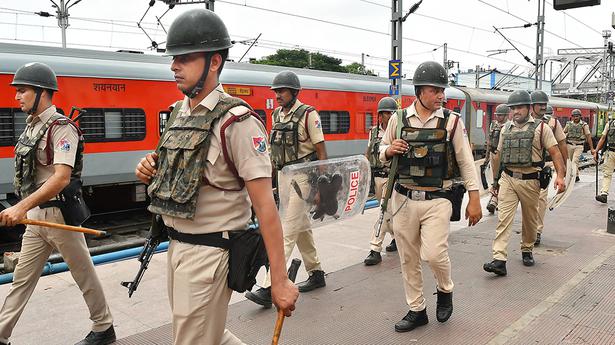
Secunderabad violence mastermind booked for over two dozen charges
The Hindu
HYDERABAD
Avula Subba Rao, director of a clutch of centres of Sai Defence Academy in Telangana and Andhra Pradesh and chief conspirator in the violence that rocked the Secunderabad railway station on June 17 has been arrested by police along with three others. His motive was to mount pressure on the government so that the Agnipath scheme would be suspended, the Government Railway Police which arrested him said on Saturday.
His coaching centres were making huge profits in the name of Common Entrance Examination (CEE), and with Agnipath scheme, Mr. Subba Rao felt that there was a risk of shutting down his centres, the police claimed.
For the large-scale violence and arson, that also resulted in the death of a young Army job aspirant from Warangal district, he was booked under 26 sections – under the IPC, the provisions under the Railway Act and the Prevention of Damage to Public Property Act.
Informing of his Friday arrest, along with his three associates – Malla Reddy, Shiva Kumar and Beesi Reddy – the GRP released a statement on Saturday.
The police explained that Mr. Subba Rao, who worked as a nursing assistant in the Army till 2011, set up the Sai Defence Academy at his native village Narsaraopet, Guntur, in 2014. Familiar with the recruitment process, he along with his staff targetted aspirants at various physical fitness and selection centres and grabbed them early in the name of preparation for medical tests and guaranteed selection. The Academy over the years also grew in size with multiple centres set up in various parts of Telangana and Andhra Pradesh.
As a procedure, the Academy collected original certificates of the candidates at the time of admission and also executed a conditional bond worth ₹3 lakh, which was to be paid after securing the job to get the certificates released. The Academy got student aspirants from several southern States.
In 2019 too, the Academy trained several aspirants. But owing to COVID-19, the written exam was postponed several times, for which the prospective students had also approached the Army Recruiting Offices and submitted representations.

“Writing, in general, is a very solitary process,” says Yauvanika Chopra, Associate Director at The New India Foundation (NIF), which, earlier this year, announced the 12th edition of its NIF Book Fellowships for research and scholarship about Indian history after Independence. While authors, in general, are built for it, it can still get very lonely, says Chopra, pointing out that the fellowship’s community support is as valuable as the monetary benefits it offers. “There is a solid community of NIF fellows, trustees, language experts, jury members, all of whom are incredibly competent,” she says. “They really help make authors feel supported from manuscript to publication, so you never feel like you’re struggling through isolation.”

Several principals of government and private schools in Delhi on Tuesday said the Directorate of Education (DoE) circular from a day earlier, directing schools to conduct classes in ‘hybrid’ mode, had caused confusion regarding day-to-day operations as they did not know how many students would return to school from Wednesday and how would teachers instruct in two modes — online and in person — at once. The DoE circular on Monday had also stated that the option to “exercise online mode of education, wherever available, shall vest with the students and their guardians”. Several schoolteachers also expressed confusion regarding the DoE order. A government schoolteacher said he was unsure of how to cope with the resumption of physical classes, given that the order directing government offices to ensure that 50% of the employees work from home is still in place. On Monday, the Commission for Air Quality Management in the National Capital Region and Adjoining Areas (CAQM) had, on the orders of the Supreme Court, directed schools in Delhi-NCR to shift classes to the hybrid mode, following which the DoE had issued the circular. The court had urged the Centre’s pollution watchdog to consider restarting physical classes due to many students missing out on the mid-day meals and lacking the necessary means to attend classes online. The CAQM had, on November 20, asked schools in Delhi-NCR to shift to the online mode of teaching.









